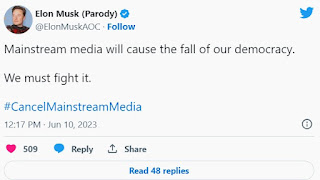Mainstream media will cause the fall of our democracy.
— Elon Musk (Parody) (@ElonMuskAOC) June 10, 2023
We must fight it. #CancelMainstreamMedia
A healthy democracy requires an informed and engaged citizenry, diverse media sources, responsible journalism, and critical thinking skills.
The claim that mainstream media will cause the fall of democracy is a broad and complex assertion that requires careful examination. While media can have a significant influence on public opinion and political discourse, it is important to consider multiple perspectives and factors when discussing its impact on democracy.
Media Influence: Mainstream media plays a crucial role in shaping public opinion by providing information, analysis, and commentary on current events. Its ability to influence public sentiment and perception can impact democratic processes. However, it's important to note that media is just one of many factors that influence public opinion, including personal experiences, education, social interactions, and political ideologies.
Bias and Objectivity: A common criticism of mainstream media is the perception of bias in reporting. The concentration of media ownership in the hands of a few corporations can lead to concerns about a lack of diversity in perspectives. Bias, whether real or perceived, can erode trust in the media and contribute to polarization within society. However, it is essential for citizens to critically evaluate news sources, seek diverse perspectives, and rely on fact-checking to make informed judgments.
Social Media and Disinformation: The rise of social media has brought both opportunities and challenges for democracy. While it has allowed for greater participation and access to information, it has also facilitated the spread of disinformation and misinformation. False narratives, conspiracy theories, and propaganda can distort public discourse and undermine democratic processes. Addressing this issue requires media literacy education, fact-checking initiatives, and responsible platform policies.
Media Ownership and Pluralism: Concentration of media ownership can limit the diversity of voices and perspectives, potentially undermining democratic values. A healthy democracy benefits from a plurality of media outlets that provide a range of viewpoints, fostering robust debate and ensuring accountability. Promoting media pluralism and supporting independent journalism are vital for the health of democracy.
Civic Engagement and Personal Responsibility: The strength of a democracy relies on the active engagement of its citizens. While media can shape public opinion, individuals have agency in consuming news critically, seeking multiple sources, and engaging in constructive dialogue. Promoting media literacy, critical thinking skills, and fostering a culture of civic responsibility are crucial in mitigating the negative effects of media on democracy.
Why is the mainstream media biased?
Media bias can arise from a variety of factors, and it is important to recognize that bias can manifest in different forms. Here are some reasons why media bias can occur:
Personal Beliefs and Ideologies: Journalists, like any individuals, hold their own beliefs and values that can influence their reporting. These personal biases, whether conscious or unconscious, can shape the selection of stories, framing, and presentation of information. It is crucial for journalists to strive for objectivity and separate personal opinions from their professional work.
Organizational Influence: Media outlets can have their own biases based on the ownership, editorial policies, or ideological leanings of the organization. Certain media organizations may align with specific political ideologies or have financial interests that shape their reporting. This can lead to a perceived or actual bias in the coverage of certain topics.
Audience Appeal and Ratings: Media organizations are often driven by commercial considerations, seeking higher ratings, viewership, or readership. In an effort to attract and retain audiences, they may prioritize sensationalism, controversy, or entertainment value over comprehensive and objective reporting. This pursuit of attention and profit can contribute to biased narratives or a focus on superficial aspects of news stories.
Selective Reporting and Framing: Media bias can also emerge from the selection and presentation of news stories. Decisions about which stories to cover, how much prominence to give them, and the framing used can influence public perception. Biases can arise from the omission of certain perspectives, cherry-picking data, or using loaded language that favors one side of an issue over another.
External Pressures and Influence: Media organizations can face external pressures, such as political pressures, advertising influences, or corporate interests. These pressures can impact editorial decisions and potentially lead to biased reporting. Journalists may face constraints or biases imposed by their superiors, advertisers, or other external actors.










